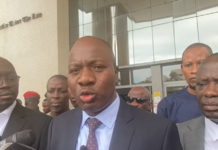
The Bank of Ghana has revealed that credit to the private sector by banks remains weak.
Addressing the 117th monetary policy press briefing, Governor of the Bank of Ghana, Dr. Ernest Addison revealed that despite a rebound in economic activities, private sector growth has dropped drastically.
“As at February 2024, private sector credit growth was 5.1 percent compared with a 29.5 percent growth recorded in February 2023.”, he revealed.
“In contrast, as of February 2024, banks’ investments in GOG and BOG instruments stood at GHS53.6 billion, an increase of 67.6 percent year-on-year, compared with an increase of 36.9 percent for the corresponding period of 2023. In real terms, credit to the private sector contracted by 14.7 percent, relative to a 15.3 percent contraction recorded over the same comparative period in February 2023” he further explained
The governor attributed the decline in private sector growth to weak asset quality.
“The fourth quarter GDP growth of 3.8 percent was driven by all three sectors. The updated CIEA also improved further in January, following the upturn in December 2023, affirming the rebound in economic activity. This was supported by broad improvements in sentiments, amid improvement in the PMI reflecting some uptick in business purchasing activity and new orders. Private sector credit, however, remained sluggish explained by the risk aversion of banks as asset quality weakened over the period.”, he emphasized.
The Central Bank however insists the banking sector remains stable, despite these elevated credit risks.
Meanwhile, the latest findings from the fourth wave of the Ghana Business Tracker revealed that 85% of firms have found it difficult to access finance post-COVID.
“Firms continue to experience difficulties in accessing finance post the COVID-19 pandemic. More than four out of five firms (85%) reported difficulty accessing finance across all size categories, “portions of the report capture.
93.1% of larger firms (100+ employees) per the survey reported difficulties in accessing finance, with 80% of medium-sized firms also reporting the same.
The report also highlighted that the dominant constraints in accessing finance are interest rate (50.9%), unwillingness by financial institutions to offer support (30.0%), high repayment risk (25.8%), and a lack of collateral (16%).
Source: Ghana/Starrfm.com.gh/103.5FM/Christabel Afful




